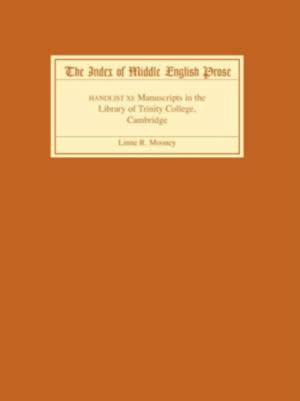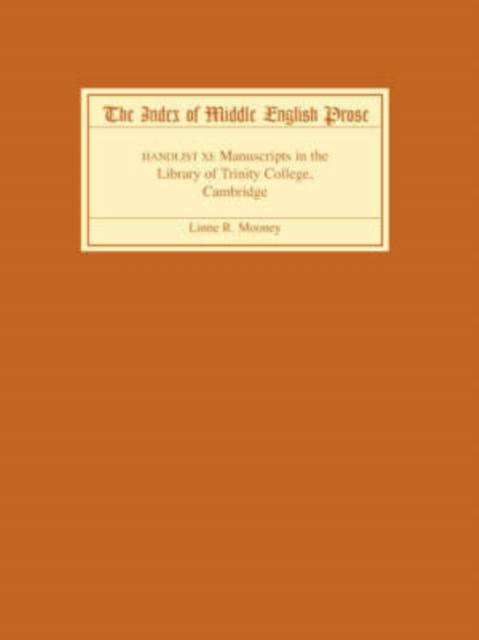
- Afhalen na 1 uur in een winkel met voorraad
- Gratis thuislevering in België vanaf € 30
- Ruim aanbod met 7 miljoen producten
- Afhalen na 1 uur in een winkel met voorraad
- Gratis thuislevering in België vanaf € 30
- Ruim aanbod met 7 miljoen producten
Zoeken
The Index of Middle English Prose, Handlist XI
Manuscripts in the Library of Trinity College, Cambridge
Linne R Mooney
€ 169,45
+ 338 punten
Omschrijving
The Library of Trinity College, Cambridge, contains the largest collection of medieval manuscripts of any college in Great Britain, and one of the most important collections in the world. The subjects contained therein cover the whole range of topics usual to medieval manuscripts, with the single bias being that the majority were produced in Britain. Particularly noteworthy are Wycliffite translations of the Bible, sermons, and Wycliffite tracts; three manuscripts containing Nicholas Love's 'Mirror of the Blessed Lif of Ihesu Crist'; and major collections of devotional texts. Trinity is also rich in medieval scientific manuscripts, many of which came through Roger Gale's interest in this field; they include a number of large medical manuscripts whose compilers were apparently trying to bring together much of the current knowledge of the day, from tracts by such men as John of Arderne and Gilbertus Angelicus, with recipes for treatments, under a single cover. The collection also contains major compilations of alchemical tracts; historical and legal material; and unique Middle English translations of classical and early medieval texts. Finally, a number of known Middle English texts not previously thought to be in the Trinity Collection are identified, opening new areas for study of Trinity's manuscripts, especially the medical and scientific texts which have much to tell of scientific learning in England in the later middle ages. LINNE R. MOONEY is Associate Professor of English at the University of Maine (and a former graduate of the Center for Medieval Studies at Toronto).
Specificaties
Betrokkenen
- Auteur(s):
- Uitgeverij:
Inhoud
- Aantal bladzijden:
- 296
- Taal:
- Engels
- Reeks:
- Reeksnummer:
- nr. 11
Eigenschappen
- Productcode (EAN):
- 9781843841463
- Verschijningsdatum:
- 16/08/2007
- Uitvoering:
- Paperback
- Formaat:
- Trade paperback (VS)
- Afmetingen:
- 210 mm x 279 mm
- Gewicht:
- 662 g

Alleen bij Standaard Boekhandel
+ 338 punten op je klantenkaart van Standaard Boekhandel
Beoordelingen
We publiceren alleen reviews die voldoen aan de voorwaarden voor reviews. Bekijk onze voorwaarden voor reviews.








